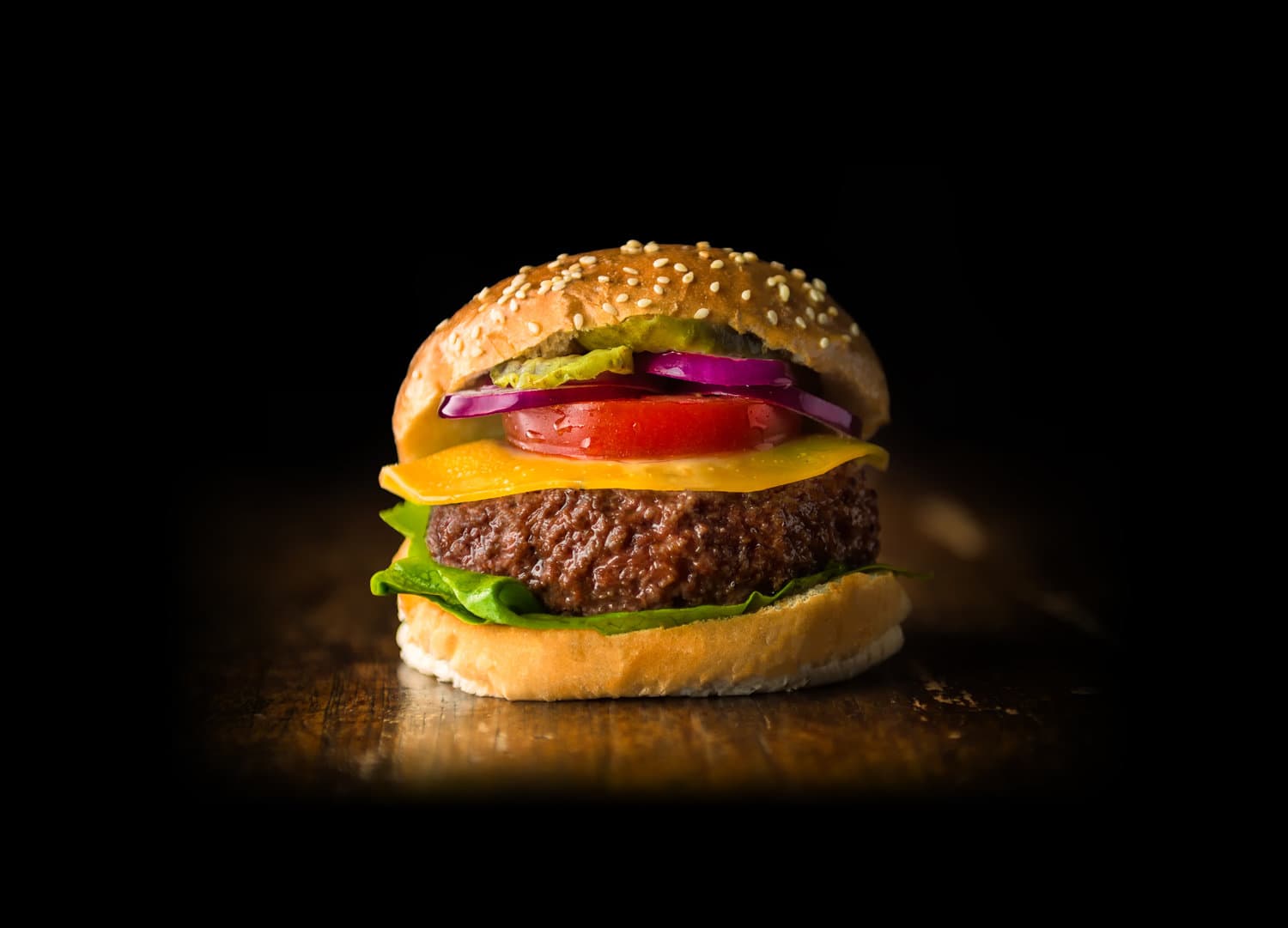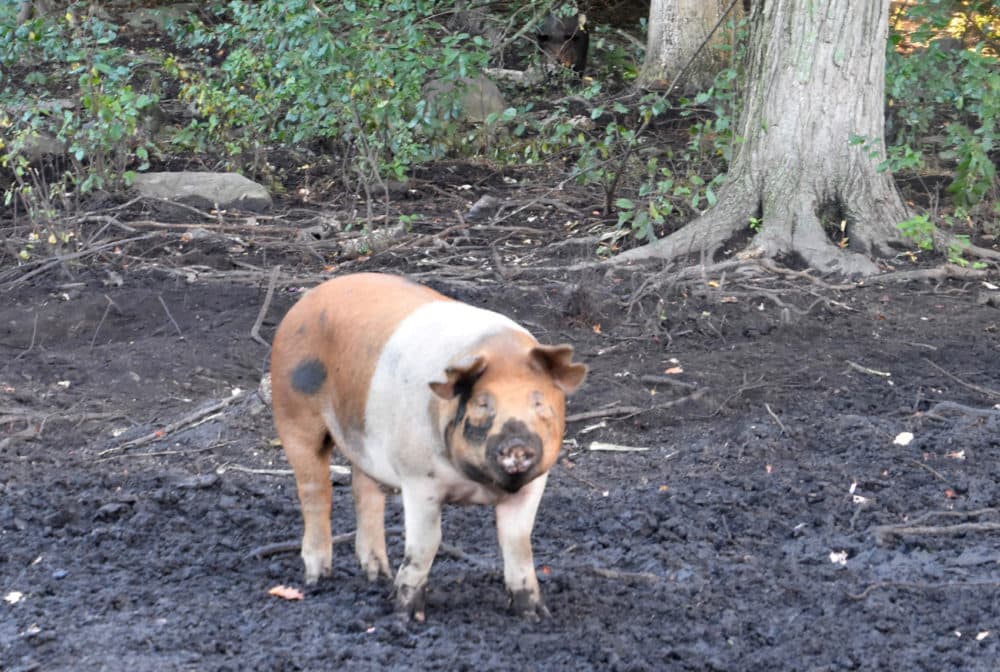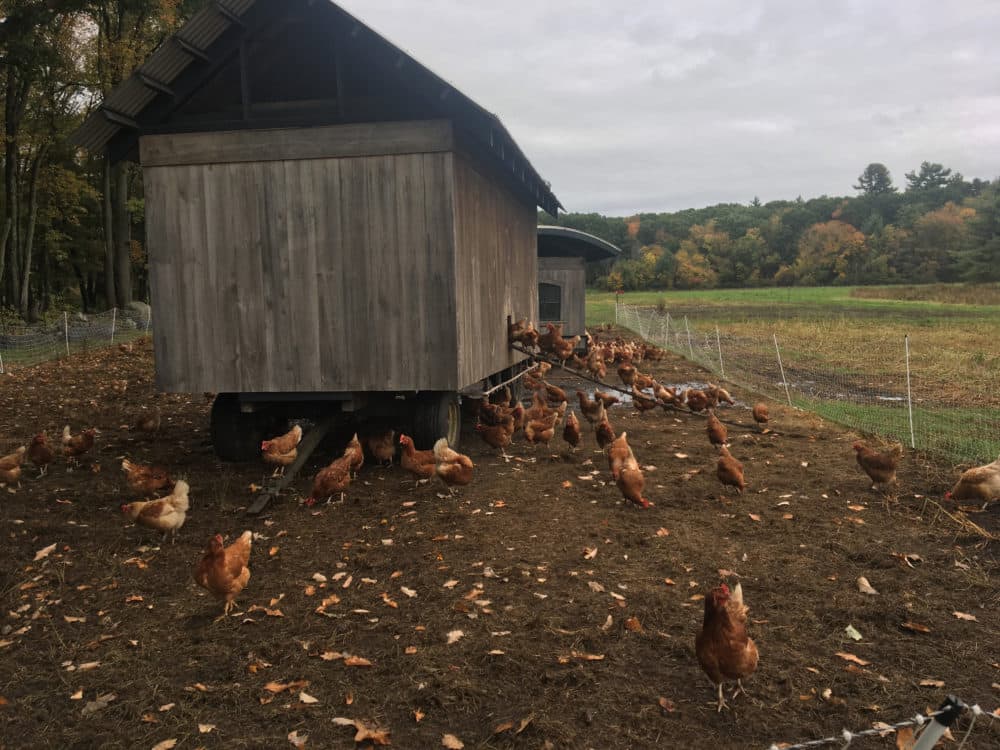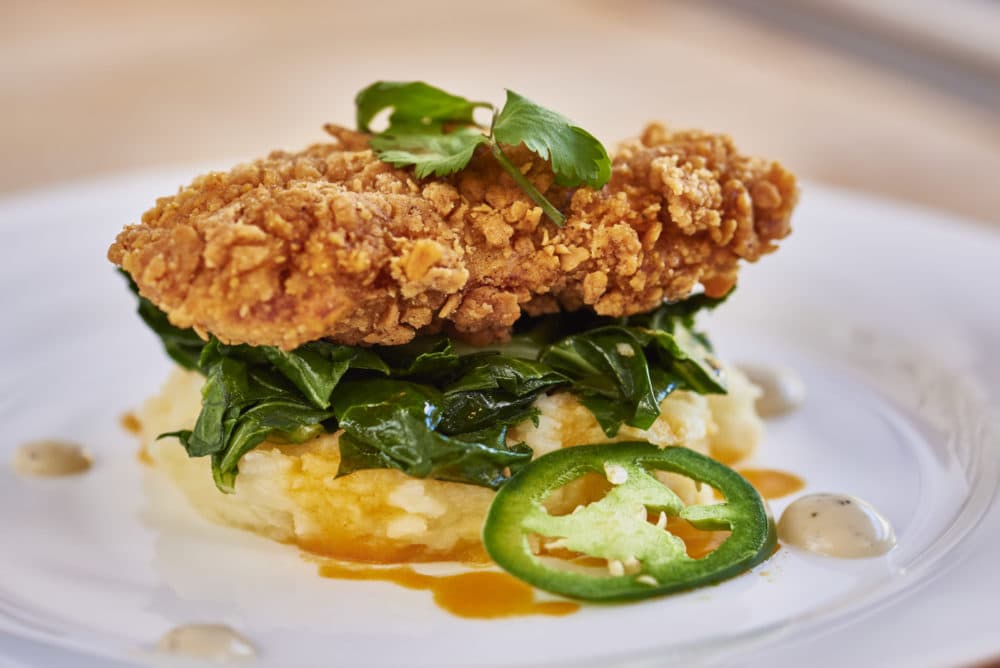Advertisement
Lab To Table
Have Your Pig And Eat It, Too? A Look At The Future Of Meat

This story is part of our series "Lab to Table: The Future of Our Food." Stories will publish every Monday until Dec. 17. In the spring, the series will continue with another week of stories.
Outside of the Cyclorama in Boston’s South End, dozens of people wait in line for the Boston Beer and BBQ Fest. And, as you might imagine, a lot of them eat meat.
"[I'm] always down for a good steak, steak tips, you know, ribs, barbecue,"says Sydney White. The Brighton resident is a "shameless" meat lover.
And White is far from alone. According to the U.S. Department of Agriculture, the average American will consume more than 220 pounds of red meat and poultry — and other products derived from these animals — in 2018. That's a record high for the nation.
But there's also a growing number of meat alternatives popping up in restaurants and grocery stores. New data show that sales of plant-based meat products grew 23 percent over the last year. So, if this figure continues to rise, could the future of meat eventually mean … less meat?
Environmental Impact
There are a number of reasons to think it could. One is concern over the environmental impact of the meat industry.
According to Alison Rabschnuk, a Boston-based employee of The Good Food Institute, a nonprofit supporting the development of meat alternatives, greenhouse gas emissions from the meat industry were higher than "the entire transportation sector combined."
But, as Rabschnuk ties her claim to global U.N. data, others reject those figures.
"That’s completely false," Diana Rodgers, a registered dietitian, says, citing domestic EPA data.
Advertisement
The data on both sides has been called into question. The metrics used vary from study to study, so comparing facts and figures is tricky.
But environmental impact isn’t the only point of contention in arguments over eating meat.
For example, processed meat — hot dogs, bacon, sausage — has been classified as a carcinogen by the World Health Organization, which also calls red meat — beef, pork, lamb — a “probable” carcinogen.
Rodgers also takes issue with that label.
"Unfortunately, most of the data that's out there vilifying red meat is based on epidemiology, which absolutely can't prove cause at all," she says. "So your average risk of colon cancer is about 5 percent in the general population. If you were to eat bacon every day the risk of your getting colon cancer goes from 5 percent to 6 percent."
Not as scary sounding, right? However, Walter Willett, a professor of epidemiology and nutrition at Harvard’s T.H. Chan School of Public Health, says it's just not that simple.
"If the only thing that red meat did or bacon did was to increase your risk of colon cancer then it might not be so bad. We wouldn't make too much of a fuss about it," he says. "But a higher consumption of red meat also increases your risk for cardiovascular disease, diabetes [and] total mortality. That all adds up to a lot of adverse health outcomes."
Willett advocates for protein sources like nuts, soy and fish, instead of red meat.
Animal Treatment
Over at the Boston Veg Food Fest last month, Evelyn Kimber, president of the Boston Vegetarian Society, explains why she’s been meat-free since 1984.
"I've always loved animals and hadn’t connected really my love of animals with what was on my plate," she says. "But the more you learn about how the animals are treated in factory farming and slaughter, it's just very compelling and very motivating to want to not be part of that."
The vast majority of the meat consumed in the U.S. comes from animals raised on factory farms, which are designed to maximize profits. They use indoor confinement and large amounts of antibiotics and hormones to grow animals faster and larger.

But out in Carlisle, on the organic farm where Rodgers lives, there's a different scene. A handful of multicolored, heritage pigs shuffle through a large forested area. As a pig sneezes somewhere nearby, Rodgers says the animals have acres of space to roam.
She calls the farm's approach “regenerative.”
"That's the new term. We used to call it sustainable farms. But the idea is that it's as close-loop as possible with your nutrients," she says. "And so animals are incredibly important in that cycle."
Rodgers says that grazing animals fertilize the soil, rather than depleting it, which makes it possible for more animals to be raised on a given piece of land. Rodgers hopes this system becomes the future of meat production.

Lab Meat
But Rabschnuk, of The Good Food Institute, says there is a way you can have your pig and eat it, too: cultured meat. That's meat grown in a lab using cells extracted from an animal without harming it.
"Chicken, duck, beef, fish. Honestly, it could be any animal," she explains. "And what they need to do is get a sesame seed-size[d] cell biopsy from the animal. What these cells need to do is be bathed in some kind of a nutrient bath in order for them to grow."
Now, if the whole thing sounds a little like mad science, Rabschnuk says, consider this: "If you ever go into a brewery and you see these big large steel bioreactor tanks, that's exactly what we project what a cell-based meat factory will look like."
The business opportunity here is potentially huge. About 20 companies around the world are already developing cultured meat. Two of the biggest meat processors in the U.S. — Tyson and Cargill — are backing these startups.

But whether or not these companies have legs depends on whether traditional meat-eaters are willing to try cultured meat.
Back outside the Boston Beer and BBQ Fest, some people, like Minnesotan Colby Starker, are "wholly behind" lab-grown meat.
"I mean, it depends on whether I would like it, but as a protein product that we can develop in a lab, I think that’s totally reasonable," he says.
So, how long will cultured-meat-curious folks like Starker have to wait to find out?
Rabschnuk says it’ll probably be another three to four years before we start seeing lab meat on menus, and likely another decade before it’s widely available in grocery stores.
But she says it’ll be worth the wait for reasons beyond taste.
"There's no air pollution, water pollution that's generated," Rabschnuk says. "There also is no fecal contamination. So cell-based meat has no intestinal track. So as a result of that, we won't have the contamination and foodborne illnesses that we, a lot of times, see with animal meat."
Harvard professor Willett says it’s too soon to evaluate cultured meat from a nutritional standpoint, but he is curious to see where it goes.
"I would encourage people to be creative," he says. "I'm glad somebody is looking at cultured meat, actually."
But Willett says the big problem of sustainability in the face of a growing global population won't be solved by lab-grown meat alone.
So when it comes to solutions, what about an idea like Rodgers’ regenerative farming?
"You can't feed 10 billion people, which is going to be the population projected by 2050, using that model," Rabschnuk says. "There's not enough land on Earth."
No matter what direction the future of meat goes in — whether it’s regenerative farming, cultured meat, no meat or something still unknown — it’ll have to be about more than just opening our minds and mouths to something new.
Because if our diets aren’t sustainable, there is no future.
Correction: A previous version of this story misspelled Diana Rodgers' name. The story has been updated. We regret the error.
This segment aired on November 19, 2018.

